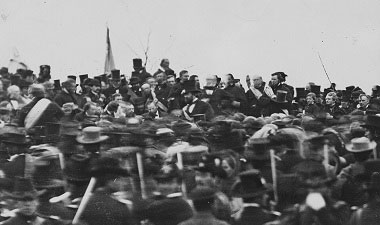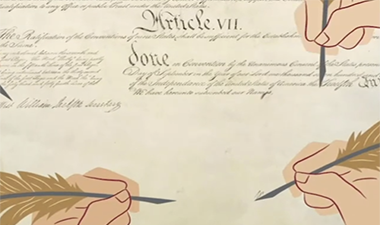
By Rosemarie Zagarri Distinguished University Professor, George Mason University
Rosemarie Zagarri explains that while the list of grievances is today an overlooked part of the Declaration of Independence, the list was arguably the most critical section of the document in 1776.
At the heart of the Declaration of Independence lay twenty-seven grievances that form the core of the colonists’ case against Great Britain. Today, this section is at once the most overlooked part of the Declaration and the least well-understood. Yet at the time it was written in 1776, the list was arguably the most critical section of the document. One after another, the list provided a litany of the “repeated injuries and usurpations” that Britain had unleashed against the colonies, depriving the colonists of their rights and leading them to seek independence. Significantly, the grievances were not addressed to Parliament, the source of many of Britain’s odious policies, but rather to the King, who was referred to as “He . . . , ” or “the present King of Great Britain.” King George III was clearly and unequivocally held responsible for all the colonists’ travails. Why was this so?
Unlike today, the British king in the eighteenth century was far more than a symbolic figurehead or nominal head of state. The monarch possessed a wide array of powers, including the authority to appoint ministers of the realm, call up troops, and issue proclamations that carried the weight of law. In British North America, the monarch had issued the colonial charters that authorized settlement and established British domain over foreign lands. Acting through the Board of Trade, the monarch supervised the governance of the colonies. Yet colonists also possessed a great deal of autonomy to govern themselves. Under the charters, each colony (Massachusetts, Virginia, New York, etc.) was entitled to have its own government, with an elected lower house of the assembly, an appointed upper house, and an appointed governor. Voters (i.e., eligible white male property owners) elected representatives to their individual assemblies, who passed laws and taxed their inhabitants. Parliament played only a limited role, restricted primarily to the regulation of trade and administration of the larger British empire. Since colonists sent no representatives to Parliament, Parliament was assumed to have no power to tax them.
Anglo-American tradition and John Locke’s contract theory of government assigned a special place to the relationship between the king and his colonists. Subjects owed their rulers duty, service, and allegiance. The colonists responded with loyalty, affection, and obedience. At the same time, rulers had specific obligations to the people, including a duty to protect their “unalienable Rights.” After the end of the French and Indian War in 1763, Americans discovered that the king repeatedly refused to protect their rights and defend their liberties. Neither Parliament nor the king’s ministers could be blamed. The king had, in effect, become a tyrant.
The Declaration’s charges against the king fell into three separate sections. Each section described attacks on the colonists’ “unalienable rights”: to life, to liberty, and to the pursuit of happiness. The first section of grievances (#1-12) addressed the king’s failure to protect the colonists’ “pursuit of Happiness.” As is well known, Thomas Jefferson, the drafter of the Declaration, altered Locke’s original formulation from “life, liberty, and estate” (commonly understood to refer to “property”) to “life, liberty, and the pursuit of Happiness.” Historians have long debated what Jefferson meant by this phrase. It is generally agreed that the phrase did not refer to an individual emotion, such as a feeling of joy or pleasure. Instead, the “pursuit of Happiness” alluded to a shared status, a collective happiness that was at once broader and more universal than the protection of property. The implication was that by promoting “happiness” a government would protect, and provide for, the people’s safety, security, and general welfare.
The first twelve grievances identified Britain’s particular actions and policies that threatened various aspects of the colonists’ collective “happiness.” With the passage of time, Americans had concluded that Britain’s oversight of the colonies was impinging on their freedom to govern themselves as they chose. When, for example, the colonial legislatures passed a law, Britain required that the acts be sent to the Board of Trade for final approval. Sometimes, the Board rejected the colonial laws—a practice that, according to the Declaration, overturned measures that the colonists deemed “wholesome” or “necessary for the public good” (#1). At the same time, the Declaration also objected to the requirement that colonial laws include a so-called “suspending clause” (#2), a provision that prevented the laws from becoming operational until receiving British approval. It sometimes took years to receive a response. Existing in a state of legal limbo was not, the Declaration suggested, conducive to the colonists’ feeling of well-being or the preservation of good order.
The Declaration also charged that the king’s representatives in the colonies, the royal governors, were interfering with the colonists’ ability to exercise their right to representative government. During the 1760s and 1770s, as hostilities intensified the colonial assemblies became hotbeds of resistance to England. They issued protests, sent complaints to the king and Parliament, ordered boycotts of British goods, and coordinated resistance with other colonies. In response, colonial governors sometimes refused to hold elections or dissolved meetings of the legislatures—all, according to the Declaration, because the legislatures had opposed “with manly firmness, his invasion on the rights of the People” (#5). At other times, governors forced the legislatures to meet in new locations — places which were, according to the Declaration, “unusual, uncomfortable, and distant from the depository of their Public Records” (#4). Without adequate representation, colonists believed that they were, according to grievance #6, exposed to “all the dangers of invasion from without, and convulsion [from] within.” There were also assaults on the judicial branches, policies that either limited the independence of judges (#9) or failed to allow colonies to establish the necessary “Judiciary Powers” within their borders (#8). Even more ominously, the Crown had recently sent a whole slew of new government-appointed officials, including revenue-collecting officers, to supervise the administration of English laws in the colonies. Colonists regarded these actions as nothing less than an invasion of their territory, with “swarms of Officers [sent] to harass our People, and [to] eat [them] out of their substance” (#10).
The Declaration also pointed to other actions that undermined the colonists’ sense of safeness and security, another component of “happiness.” Complaint #11 charged the Crown with keeping “among us, in times of Peace” a standing army without the consent of our legislatures.” Since the end of the French and Indian War, Britain had maintained more than 10,000 troops on the colonial frontier. In 1768, troops were sent to Boston to cow and intimidate a rebellious civilian population. In 1774, in response to the Boston Tea Party, the king sent General Thomas Gage to serve as the military governor of Massachusetts. This travesty, according to the colonists, established a government that, in effect, rendered “the Military independent of and superior to the Civil Power” (#12). The Quartering Act of 1774, reinforcing a previous act passed in 1765, compounded the problem, permitting “the quartering [of] large bodies of armed troops among us” (#14). Harassment and defilement could hardly be construed as Britain protecting the colonists’ general welfare.
In the Declaration’s central section (#13-22), the charges shifted away from attacks on the colonists’ collective happiness and pointed to assaults on the second set of “unalienable rights”: liberty. Since 1763, Parliament had passed one law after another that had infringed upon the colonists’ traditional rights as Englishmen. These laws mandated, among other things, the quartering of troops among the civilian population; allowing British soldiers who murdered colonists to face trial in England rather than the colonies; prohibiting the colonists from trading with the rest of the world; taxing the colonists without their consent; and depriving the colonists of the right to trial by jury (a reference to Admiralty courts) (#14-19). Such laws violated the kind of rights that Britons had held sacred since time immemorial. Yet the king not only failed to veto these unjust laws, he had given “his Assent to their Acts of pretended Legislation” (#13). In fact, however, no monarch since Queen Anne in 1708 had exercised the monarch’s prerogative to veto an act of Parliament. It seems unlikely that King George III ever even considered the possibility.
The Declaration also expressed particular outrage that the king had not intervened when Parliament had, in violation of its authority, infringed on the colonists right to self-government. In addition to taxing colonies without their consent, Parliament had passed a number of statutes that expanded its power over the colonies. In the Declaratory Act of 1766 (#22), for example, Parliament asserted its right “to legislate for us in all cases whatsoever” — a claim the colonists emphatically denied. Other parliamentary statutes unilaterally altered the structure of the colonial charters, interfered with meetings of the colonial assemblies, or intervened in matters of internal governance (#21 and 22). The Quebec Act of 1774 appeared particularly ominous. Under its terms, Parliament established a system of government in French Canada that did not include a representative assembly. Fearing that the act foreshadowed their own future, the Declaration objected to the establishment of “an Arbitrary government” in Quebec. Less concerned about the Canadians than themselves, the colonists worried that Britain might soon introduce “the same absolute rule into these Colonies” (#20).
In the final series of grievances (#23-27), the Declaration moved from a focus on the colonists’ liberties and pursuit of happiness to threats against the third of the “unalienable Rights”: the right to “Life.” By 1775, the British had decided that only force and violence would intimidate the colonists into submission. Britain actively began to incite “domestic insurrections amongst us,” seeking to incite rebellions among enslaved people and foster unrest among Native Americans. Lord Dunmore, the royal governor of Virginia, offered freedom to enslaved people who ran away from their rebellious masters and joined the British Army. On the frontier, the British agents instigated “merciless Indian savages” to attack inhabitants who lived in the backcountry (#27). In August 1775, the Crown declared the colonies to be in rebellion (#23). King George III sent 40,000 British troops as well as German mercenaries to fight in North America. The British Navy attacked American trade on the high seas, burnt down coastal towns, and impressed American sailors, who were, according to the Declaration, compelled to “bear Arms against their Country” (#24, 26). These actions, proclaimed the Declaration, “compleat[ed] the works of death, desolation, and tyranny, already begun with circumstances of Cruelty and perfidy scarcely paralleled in the most barbarous ages” (#25). Instead of protecting his subjects, King George III now had turned the full force of British military might against them, threatening their lives as well as their liberty and pursuit of happiness.
The Declaration’s list of twenty-seven grievances presented to “a candid world” the “Facts” enumerating King George III’s betrayals. In three concise sections, the Declaration systematically proved how the British monarch had repeatedly violated the colonists’ most fundamental rights: to “Life, Liberty, and the pursuit of Happiness.” The list of grievances ended with a final assertion: “In every stage of these Oppressions, We have Petitioned for Redress, in the most humble terms.” Yet, as the document noted, “Our repeated Petitions, have been answered only by repeated injury.” According to Lockean theory, when the king became a tyrant, the people not only had the “right” but also had the “duty” to overthrow their government: “A Prince, whose character is thus marked by every act which may define a Tyrant, is unfit to be the ruler of a free People.” In cutting their ties with the king, the Declaration of Independence thus severed the final and most essential bond that linked the colonists with Great Britain. In doing so, the Declaration both justified and declared independence.
Rosemarie Zagarri is Distinguished University Professor, George Mason University







